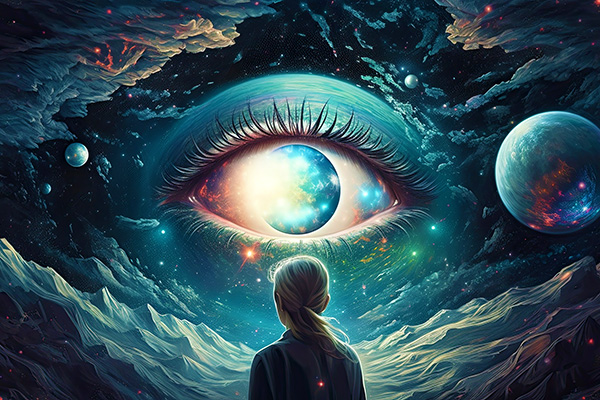christianity
Understanding Psychic Predictions
 There are many misconceptions about psychic predictions. The first misconception is that a psychic prediction is static and unchanging. The second big myth is that psychics are omniscient deities who always see everything exactly as it will happen.
There are many misconceptions about psychic predictions. The first misconception is that a psychic prediction is static and unchanging. The second big myth is that psychics are omniscient deities who always see everything exactly as it will happen.
Even if we were able to predict every possible outcome for the rest of your life, many of those predictions will become inaccurate or even a complete failure over time because the future is flexible and fluid.
The future that a psychic foresees in a reading today will look slightly different in a month’s time, and will inevitably look significantly different in a year’s time. This is what distinguishes true psychic reading from fortune-telling.
Our destiny is constantly being shaped and adjusted by the creative capacity that exists within each of us. Each human being is the physical expression of a spirit essence with free will that allows us to create and navigate our reality, and direct our destiny. Our spirit, soul or consciousness shapes our daily reality and determines the course of our life journey. This process of creation is called manifestation.
Manifestation refers to the metaphysical idea that our thoughts, beliefs, and intentions produce tangible results in the external world. Manifestation is, in fact, the foundation of our very existence, for our present life journey as a spirit essence in human form is, in fact, also a manifestation!
The Compassion Of Tough Love
 We have an amazing tool within us: our heart. Not only does it keep us alive, but it also allows us to feel deep emotions, such as love and resentment, joy and sadness, achievement and loss, compassion and apathy.
We have an amazing tool within us: our heart. Not only does it keep us alive, but it also allows us to feel deep emotions, such as love and resentment, joy and sadness, achievement and loss, compassion and apathy.
Many people fail to see the power of the heart and what we as humans can do with that power for ourselves and others. The heart is in fact key to our personal and spiritual learning and our soul expansion in this lifetime.
However, many of us who strive to contribute to a better world with the power of our loving hearts have also seen that giving material things, like money, and trying to help those who refuse to help themselves, does not cure the suffering in the world. It usually only puts a band aid on the underlying problems and in time it just returns as additional problems.
We all have our own karmic lessons, and if not learned it becomes a recurring issue until we finally learn to fix it, learn from it, and move forward. Then it is no more a lesson, but a wisdom.
It is also true that we can get in the way of others learning their lessons. Sometimes we jump in too quickly or end up taking on their burden, only to find it happening again and again. Then all our efforts and sacrifice were in vain.
Invoking Archangel Michael In Your Spiritual Practice
 Archangel Michael, the divine warrior and champion of truth and justice, is a powerful figure in many spiritual traditions. He is a prominent figure in Judaism, Christianity, Islam, the Baha’i Faith, and Neo-Paganism.
Archangel Michael, the divine warrior and champion of truth and justice, is a powerful figure in many spiritual traditions. He is a prominent figure in Judaism, Christianity, Islam, the Baha’i Faith, and Neo-Paganism.
His name in Hebrew means “Who is like the Lord?” and his title “Archangel” means “Prince of Angels.” Michael is the leader of the angelic realm and is known for his strength, courage, and protection. He fights for good, empowers the faithful, and accompanies the souls of the righteous to heaven.
He is typically depicted as a warrior, complete with sword and shield. He is also often shown defeating a dragon or other monstrous creature. In Christianity, he is specifically mentioned in the Book of Revelation as battling Satan.
In some depictions, he is shown holding scales. This is a reference to his position as guardian of the dead as their souls leave the earth. Just as the Roman god Mercury accompanied souls to the underworld, Michael is said to accompany the recently deceased on their journey to the other side.
Michael is a venerable spiritual figure and is often invoked in prayer, meditation, and other spiritual practices. Believers invoke his presence for protection, guidance, and spiritual strength.
The True Meaning Of Holiday Gifts
 While wrapping Christmas gifts for family and friends today, I thought about whether it is better to be on the giving or receiving end of presents during the holiday season?
While wrapping Christmas gifts for family and friends today, I thought about whether it is better to be on the giving or receiving end of presents during the holiday season?
In my childhood, receiving presents was undoubtedly the best! But my parents also taught me the importance of giving. They gave my sister and me a small allowance during the holidays to buy gifts for others. It was fun to shop for small items to give to our loved ones. With much anticipation, wetried to pick things that people would actually like and appreciate.
I therefore learned early on that while receiving gifts can be exciting and fun, giving them can be even more rewarding.
My parents were certainly on to something, because the value of giving has been scientifically proven to be more than just a sweet sentiment. For example, according to a study by the American Psychological Association, giving to others increases life expectancy by at least five years! Another study found that people who give to others experience lower blood pressure, less depression, and lower stress levels. In addition, giving to others can increase happiness and well-being. A Harvard Business School study found that giving money to someone else increased participants’ happiness more than spending it on themselves.


